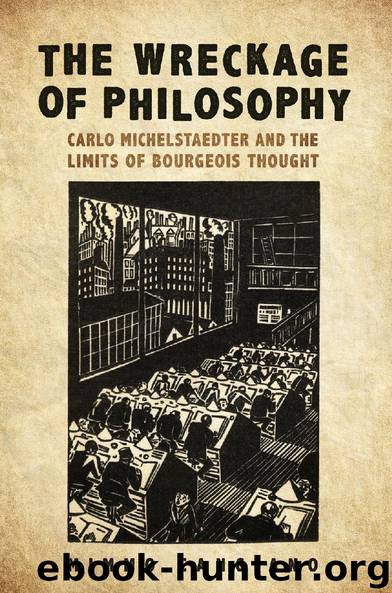The Wreckage of Philosophy: Carlo Michelstaedter and the Limits of Bourgeois Thought (Toronto Italian Studies) by Cangiano Mimmo

Author:Cangiano, Mimmo
Language: eng
Format: epub
Publisher: University of Toronto Press, Scholarly Publishing Division
Published: 2018-12-11T00:00:00+00:00
Differently than in Hegel, in Michelstaedter slave and master end up integrating their social needs. However, contrary to the interpretation that most critics of Michelstaedter have given, his reading is not some sort of misinterpretation of Hegel that equates the two figures. Rather, in Michelstaedter the needs to which the slave (worker) adapts, in the forms of social security and ideology, are no longer his: they are those of the master, transmitted – in the societal organization (“connective mode”) – through a progressive levelling out of ideologies. The subject–master dictates the rules that rationalize (abstract) the correlativity of contrasts. Indeed, it is this connection between the functioning of society and the needs of the strongest that allows Michelstaedter to interpret social life as a form of struggle against society. For Michelstaedter, the irrational side of this societal conformation is identified not with the presence of the proletariat (as it is in the Marxist perspective), but rather with the “pain” of the lone individual who perceives himself as unappeased in what he defines at the social level as the creaking the system’s cogs. Yet the self-alienation of the master and that of the slave must be distinguished from each other, in that the second is compelled to adapt to the first.
Money represents for Michelstaedter the parallel of this progressive levelling. Unbound to an immediate use-value, it allows for an infinite possibility of relations/exchanges that are, in appearance, less and less conflicting. Likewise, the various ideological positions become increasingly comparable as they more and more fall prey to the abstraction that fictitiously unites, from top to bottom, the social fabric: “Money, the actual means of communicating the societal violence by which each is the master of the work of others: … the drive belt turning the machine’s wheels – it shall be like a divinity raised up to heaven, becoming perfectly nominal, an abstraction, when the wheels are so well adjusted that the wheels of each shall enter into the wheels of the other without the need of transmission” (Persuasion, 137).16
Therefore, the abstraction that takes place does not happen merely on a subjective level (by the individual through his cognitive faculties). The communication of social violence – the individual’s need to adapt to the hegemonic values of society, the recognition in them of security and of the easiest means of satisfying his needs/desires – is actualized through money. This is why language, another space of ideological adjustment, is equated with money, in the same way that structures such as retirement, insurance, salaries – also criticized by Michelstaedter – should be understood.
Money separates man from himself; it forces him to identify the satisfaction of his needs with the prevalent needs of society, which are transmitted as abstractions and are inevitably defined by those who control society – that is, by those who possess, among other things, money itself, the possession of which provides the material force to allow determined opinions and ideologies to prevail over others.17
The creation of ideological products (knowledge expressed in
Download
This site does not store any files on its server. We only index and link to content provided by other sites. Please contact the content providers to delete copyright contents if any and email us, we'll remove relevant links or contents immediately.
| African | Asian |
| Australian & Oceanian | Canadian |
| Caribbean & Latin American | European |
| Jewish | Middle Eastern |
| Russian | United States |
4 3 2 1: A Novel by Paul Auster(11049)
The handmaid's tale by Margaret Atwood(6852)
Giovanni's Room by James Baldwin(5878)
Big Magic: Creative Living Beyond Fear by Elizabeth Gilbert(4723)
Asking the Right Questions: A Guide to Critical Thinking by M. Neil Browne & Stuart M. Keeley(4576)
On Writing A Memoir of the Craft by Stephen King(4213)
Ego Is the Enemy by Ryan Holiday(3991)
Ken Follett - World without end by Ken Follett(3972)
The Body: A Guide for Occupants by Bill Bryson(3802)
Bluets by Maggie Nelson(3711)
Adulting by Kelly Williams Brown(3671)
Guilty Pleasures by Laurell K Hamilton(3586)
Eat That Frog! by Brian Tracy(3514)
White Noise - A Novel by Don DeLillo(3436)
The Poetry of Pablo Neruda by Pablo Neruda(3367)
Alive: The Story of the Andes Survivors by Piers Paul Read(3311)
The Bookshop by Penelope Fitzgerald(3226)
The Book of Joy by Dalai Lama(3218)
Fingerprints of the Gods by Graham Hancock(3213)
